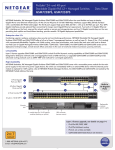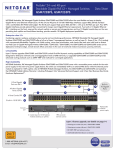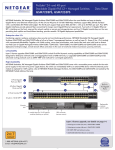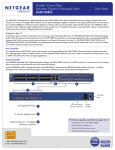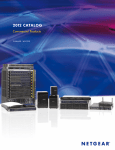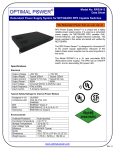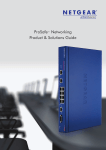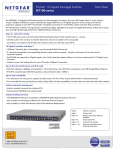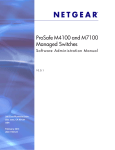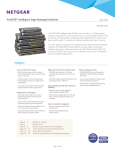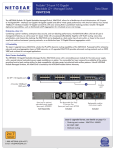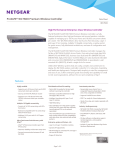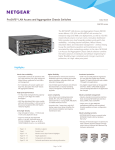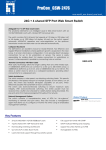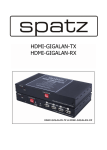Download Netgear GSM7328S
Transcript
ProSafe® 24- and 48-port Stackable Gigabit L3 Managed Switches Data Sheet GSM7328S, GSM7352S The NETGEAR Stackable Gigabit Managed Switches, the GSM7328S and GSM7352S allow the most flexible and easy-to-deploy Gigabit infrastructure. All 24 and 48 ports of 10/100/1000 Mbps interfaces deliver maximum throughput and low latency. Four (SFP) Gigabit interfaces provide optional fiber connectivity for longer reach Gigabit Ethernet requirements. Two built-in 10 Gigabit Ethernet SFP+ interfaces on the front, and two 10 Gigabit module bays on the rear, permitting both uplinks and local/distant stacking, provide versatile 10 Gigabit deployment possibilities. Enterprise-class L3 Combining superior resiliency, enterprise-class security and non-blocking performance, the NETGEAR Stackable Gigabit Managed Switches, the GSM7328S and GSM7352S offer IPv4/IPv6 dynamic routing protocols such as OSPF, VRRP and multicast for converged applications with unsurpassed affordability. Together with VLANs routing, voice-class prioritization, and chassis-like stack with Layer 2+ PoE GSM7228PS / GSM7252PS or high-density fiber L3 GSM7328FS, the GSM7328S and GSM7352S series can be deployed at the enterprise edge, remote branch offices and closer to the core of small and medium-sized businesses’ growing networks. High Availability The NETGEAR Stackable Gigabit Managed Switches, the GSM7328S and GSM7352S come with a removable power module for the main power supply. In the event of a power supply failure, the switch can immediately shift to an external RPS device while the internal power module is replaced for 100% uptime. Like all NETGEAR ProSafe Managed Switches, the GSM7328S and GSM7352S are backed by the NETGEAR ProSafe Lifetime Warranty. 24 and 48 1 Gigabit Ports 1 4 Combo SFP ports 2 3 2 1 3 Built-in 10 Gigabit Ports 2 Built-in 10 GE SFP+ 3 Replaceable modular power supply Console port 2 module bays for 10 GE options modules (stacking or uplinks) RPS connector (remove screws) 24 / 7 TECHNICAL S U P P O R T* 1-888-NETGEAR (638-4327) Email: [email protected] -1- ProSafe ® 24- and 48-port Stackable Gigabit L3 Managed Switches GSM7328S, GSM7352S Features at a Glance GSM7328S Hardware Main Features 24/48-port Gigabit 10/100/1000 GSM7352S Benefits • Gigabit performance for growing networks • Ultra low latency for top of rack applications 4 shared SFP (Gigabit fiber) interfaces • Fiber SX/LX connectivity for longer reach requirements • Accept Fast Ethernet 100FX SFP 2 built-in 10 Gigabit SFP+ (front) • Dramatically lower the cost of 10 Gigabit deployments • Flexible 10 GE network uplinks, server/storage • Accept short direct-attach SFP+ copper cables • Support hardware-based stacking 2 additional 10 Gigabit module bays (rear) • For stacking or other 10 GE network uplinks Physical stacking up to 8 switches/384 ports • Chassis-like unique GUI/CLI • High speed 12 x 4 = 48 GE overall stacking performance • Single IP address management • Hot swappable, automatic unit replacement • Distributed redundant trunking, any-to-any port mirroring Stack with PoE GSM72xxPS series Stack with fiber GSM7328FS • Versatile local or distant L3 10 Gigabit deployments with GSM7228PS, GSM7252PS, and GSM7328FS Removable power supply + RPS option • 100% uptime even in case of power supply failure • APS135W spare power supply can be replaced without any service interruption when used with one external RPS Software Main Features Benefits Layer 3 - IPv4 (RIPv1/v2, OSPFv1/v2, VRRP) Layer 3 - IPv6 (RIPng, OSPFv3, VRRP) • Advanced routing capabilities for converged applications Multiple STP, 802.3ad LACP, RPS support • Superior resiliency for highly available network Fabric (24/48-port) 144 / 192 Gbps Performance 107.1 / 142.8 Mpps • Non-blocking performance for critical applications IPv4 L2, L3, L4 ACL (access control lists) IPv6 L2, L3, L4 ACL (access control lists) • Enterprise-class security • Ideal for IPv4 / IPv6 transitioning networks • Ideal aggregation for small core enterprise networks • Network protection based on user profile • Network protection based on trusted application IPv4 L2, L3, L4 QoS (8 priority queues, DiffServ) IPv6 L2, L3, L4 QoS (8 priority queues, DiffServ) • Voice-class prioritization • Traffic prioritization based on user profile or application • More queues for VoIP, video & critical applications Multicast L2 – IPv4 (IGMP snooping v2,v3) Multicast L2 - IPv6 (MLD) IGMP proxy, IGMP querier Multicast L3 – IPv4/IPv6 multicast routing 8,000 MAC – 1,024 VLANs – 1,024 MC groups 64 trunks 8-port each – DHCP server/relay 224 IP routes – 128 IP interfaces • Advanced routing of multicast streams (PIM, sparse, dense) • Simplify IPTV & video large deployments • Multicast traffic reaches only the interested receivers • Deployable at enterprise edge, remote branch offices or closer to the core of SMB networks -2- ProSafe ® 24- and 48-port Stackable Gigabit L3 Managed Switches GSM7328S, GSM7352S Target Applications Unified PoE and Non-PoE Edge in Large Networks GE 10 GE Core Non PoE PoE GSM73xxS/GSM72xxPS Stack for Access GSM73xxS/GSM72xxPS Stack for Access Stacking with L2+ Gigabit PoE GSM7228PS, GSM7252PS and L3 Fiber GSM7328FS Managed Switches, the GSM7328S and GSM7352S are easily deployed at the edge of enterprise networks for converged applications: LAN telephony, wireless access points or IP cameras. Built-in 10 Gigabit SFP+ ports on the front authorize high-performance distributed trunks to the core and management is simplified. In this configuration, each stack acts a single IPv4/IPv6 routing switch, with only one GUI/CLI and multiple distributed link aggregations. SMB Network Deployments GE 10GE ReadyNAS 4200 WNDAP350 Virtualized servers GSM73xxS/GSM72xxPS Combining Local Stack (same location, same rack in four locations) and Distant Stack Using 10 Gigabit Fiber GSM73xxS/GSM72xxPS Unique Stack With GSM7228PS, GSM7252PS and GSM7328FS Managed Switches, the GSM7328S and GSM7352S simplify and lower the cost of medium-sized 10 Gigabit deployments. In this configuration, 8 stacked Switches build a 384 Gigabit ports network with 16 10 Gigabit ports available for servers and high-end storage. The hardware stacking dual-ring topology provides one unique CLI/GUI platform, simple management, network and perfect server/storage resiliency, as well as intelligent load balancing. -3- ProSafe ® 24- and 48-port Stackable Gigabit L3 Managed Switches GSM7328S, GSM7352S NETGEAR Hardware Stacking Local and Distant Stack Topology Local Stack Topology AX742 24 Gbps Stacking Kit When the switches are deployed in the same rack, one AX742 kit per switch is required for dual-ring topology, providing higher resiliency and intelligent load balancing. Each ring speed is 12 Gbps half duplex (24 Gbps full duplex). + Dual ring overall speed is 24 Gbps half duplex (48 Gbps full duplex). •Each AX742 kit contains 2 stacking modules+ 1 stacking cable •One AX742 kit per switch recommended for full 48 Gbps bandwidth and complete redundancy Distant Stack Topology When the switches are deployed in several locations, two AX743 SFP+ host modules are required per switch, with the SFP+ optics (AXM761, AXM762 or AXM763) for this hardware dual-ring topology, providing highest resiliency and intelligent load balancing. Each ring speed is 10 Gbps half duplex (20 Gbps full duplex). Dual ring overall speed is 20 Gbps half duplex (40 Gbps full duplex). Local and distant stack can be combined for maximum flexibility (example: “SMB Network Deployments” application, Page 3). Built-in SFP+ and Fiber Stacking Note Starting with v8.0.3 software release, the two built-in SFP+ ports on the front may also be used for stacking. The AX743 and the rear module bays are also available for fiber stacking. AX743 SFP+ Host Module AXM761, AXM762 or AXM763 SFP+ 10GBase-SR, LR or LRM optics •AX743 + AXM761/AXM762/AXM763 optics in each rear slot •Two SFP+ modules are recommended for full 40 Gbps bandwidth and complete redundancy -4- ProSafe ® 24- and 48-port Stackable Gigabit L3 Managed Switches GSM7328S, GSM7352S NETGEAR Hardware Stacking Features Single IP address management Benefits • Stack up to 8 switches as a single “chassis” logical unit • One GUI and one CLI managing the whole stack • The stack acts as a single switch in the network • The other switches in the network also see the stack as a single switch • Growth is easy, adding a switch to the stack is as simple as connecting the new unit to the stack (configuration is instantly updated) Bi-directional architecture • Higher stacking throughput capacity with lower latency and jitter for VoIP and video traffic 48 Gigabit local stacking capacity per switch using AX742 stacking kit • Each switch in the stack understands the shortest path to forward traffic, bi-directionally both up and down 40 Gigabit distant stacking capacity using AX743 + AXM761/AXM762/AXM763 (SFP+ optics) • Vertical/local stacking and horizontal/distant stacking can be mixed for convenient 10 Gigabit deployments (core, distribution layer, edge) Stack resiliency • Dual ring architecture ensures that if a switch fails within the stack all the other switches can still communicate with one another Automatic unit replacement (AUR) • Adding a new switch to the stack or replacing a failed unit requires no service interruption, the configuration file is pushed automatically by the stack Distributed trunking across the stack (link aggregation groups, LACP) • Increased performance with distributed trunks to the core Many-to-one port mirroring across the stack • More flexibility for device troubleshooting • Greater redundancy using trunking as several switches are connected to the trunk (up to 8 ports per trunk – 64 trunks are allowed) • As for a chassis, port mirroring is available from every port to every port across the stack VLANs automatic propagation across the stack • As for a chassis, VLAN port tagging or private groups are available everywhere across the stack as for a single switch (Unit 1, Port 2; Unit 2, Port 3, etc.) • No configuration required for the VLAN propagation between the switches Flexible stacking with PoE or fiber switches • Stacking with GSM7228PS/GSM7252PS/GSM7328FS • Mixing PoE and non-PoE ports into a single logical unit • Versatile deployment options Stacking with GSM7228PS/GSM7252PS Note Stackable, PoE L2+ Managed Gigabit Switches GSM7228PS and GSM7252PS are flexible enough to integrate GSM73xxS stack configurations in full Layer 3 mode without L3 License Upgrade. When integrating a GSM73xxS stack, the GSM7228PS/GSM7352PS will benefit from the Layer 3 stack full feature set, as slaves within the stack. Only the stack master determines the stack configuration/feature set. If the stack master is a GSM73xxS then the entire stack profits from the master L3 configuration. Without Layer 3 license upgrade, if a GSM7228PS/GSM7252PS becomes the master, then the entire stack will downgrade to Layer 2+ feature set. Unless Layer 2+ is the preferred feature set, it is advised to determine in advance which other Layer 3 GSM73xxS slave would become the stack master in case of the stack master failure, by specifying the secondary stack master settings in the stack configuration. With a Layer 3 license upgrade, a GSM7228PS/GSM7252PS can become the master and handle the full stack L3 configuration. -5- ProSafe ® 24- and 48-port Stackable Gigabit L3 Managed Switches GSM7328S, GSM7352S Associated Modules and Optics SFPs (optics) AXM761 ProSafe 10GBase-SR SFP+ LC GBIC • 10 Gigabit Ethernet “short-reach” fiber connectivity • LC duplex connector • Fits into the two built-in 10 GE SFP+ interfaces (front) • Fits into the 10 GE SFP+ interface of the SFP+ Adapter Module AX743 (rear bays) • Drives 10 Gigabit Ethernet up to 300 m distances with 50/125µm laser-optimized OM3 multimode fiber cables • Drives 10 Gigabit Ethernet up to 33m distances with 62.5/125µm OM1 multimode fiber cables • 5-year warranty • Ordering part number: AXM761-10000S AXM762 ProSafe 10GBase-LR SFP+ LC GBIC • 10 Gigabit Ethernet “long-reach” fiber connectivity • LC duplex connector • Fits into the two built-in 10 GE SFP+ interfaces (front) • Fits into the 10 GE SFP+ interface of the SFP+ Adapter Module AX743 (rear bays) • Drives 10 Gigabit Ethernet up to 10 km distances with 9/125µm SMF single mode fiber cables • Drives 10 Gigabit Ethernet up to 300 m distances with 50/125µm laser-optimized OM3 multimode fiber cables • Drives 10 Gigabit Ethernet up to 33 m distances with 62.5/125µm OM1 multimode fiber cables • 5-year warranty • Ordering part number: AXM762-10000S AXM763 ProSafe 10GBase-LRM SFP+ LC GBIC • 10 Gigabit Ethernet LRM “long reach multimode” fiber connectivity (802.3aq standard) • LC duplex connector • Fits into the two built-in 10 GE SFP+ interfaces (front) • Fits into the 10 GE SFP+ interface of the SFP+ Adapter Module AX743 (rear bays) • Drives 10 Gigabit Ethernet up to 220 m distances with legacy 62.5/125μm OM1 multimode fiber cables • Drives 10 Gigabit Ethernet up to 260 m distances with 50/125μm laser-optimized OM3 multimode fiber cables • 5-year warranty • Ordering part number: AXM763-10000S AGM731F ProSafe 1000Base-SX SFP LC GBIC • Gigabit Ethernet “short-reach” fiber connectivity • LC duplex connector • Fits into the four shared SFP interfaces (front) • Drives Gigabit Ethernet up to 550 m distances with 50/125µm laser-optimized OM3 multimode fiber cables • Drives Gigabit Ethernet up to 275 m distances with 62.5/125µm OM1 multimode fiber cables • 5-year warranty • Ordering part number: AGM731F AGM732F ProSafe 1000Base-LX SFP LC GBIC • Gigabit Ethernet “long-reach” fiber connectivity • LC duplex connector • Fits into the four shared SFP interfaces (front) • Drives Gigabit Ethernet up to 10 km distances with 9/125µm SMF single mode fiber cables • Drives Gigabit Ethernet up to 550 m distances with 62.5/125µm OM1 or 50/125µm OM3 multimode fiber cables • 5-year warranty • Ordering part number: AGM732F AFM735 ProSafe 100BaseFX SFP LC GBIC • Fast Ethernet multimode fiber connectivity (IEEE 802.3-2002) • LC duplex connector • Fits into the four shared SFP interfaces (front) • Drives Fast Ethernet up to 2 km distances with legacy 62.5/125μm OM1 multimode fiber cables • Drives Fast Ethernet up to 2 km distances with 50/125μm laser-optimized OM3 multimode fiber cables • 5-year warranty • Ordering part number: AFM735-10000S -6- ProSafe ® 24- and 48-port Stackable Gigabit L3 Managed Switches GSM7328S, GSM7352S Associated Modules and Optics Modules for the Rear Bays AX742 ProSafe 24Gigabit Stacking Kit • Each kit contains two stacking modules and one stacking cable • Each module speed is 12 Gbps (half duplex)/24 Gbps (full duplex) • Configured in a resilient ring topology, delivers 48 Gbps of stacking bandwidth • One kit per switch recommended for full bandwidth and redundancy • 5-year warranty • Ordering part number: AX742 AX743 ProSafe 10Gigabit SFP+ adapter module • Interoperates with SFP+ optics GBICs such as AXM761/AXM762/AXM763 • Also interoperates with standard direct attach SFP+ cables (short copper cables with “SFP+ like” connectors) • 5-year warranty • Ordering part number: AX743-10000S AX744 ProSafe 10Gigabit CX4 module • Adds 10 Gigabit Ethernet “InfiniBand” CX4 connectivity • Fully compliant with CX4 10-GbE (IEEE 802.3ak Type 10Gbase-CX4) standard • 1 port CX4 to accommodate standard 10 Gigabit CX4 copper cables • CX4 copper cable length should remain inferior to 15 meters • Connect any servers, ReadyNAS® or switches with 10 Gigabit CX4 interface • 5-year warranty • Ordering part number: AX744-10000S 10Gigabit XFP Note The previous 10Gigabit XFP modules are compatible with GSM7328S and GSM7352S. XFP Host Module AX741 and XFP Optics AXM751/AXM752 (10GBase-SR/LR) can equip the rear bays. XFP optics are interoperable with newer SFP+ optics: for instance, an XFP-equipped switch can connect with another SFP+-equipped switch, this is the same 10GBaseSR/LR standard and the same fiber. Only the module form factors are different. APS135W ProSafe Auxiliary Power Supply Spare Modular Power Supply • Provides a replaceable power supply • When an RPS (redundant power supply) is used, the power supply can be replaced without stopping the switch or requiring a reboot (hot swap) • 5-Year Warranty • Ordering part number : APS135W-10000S RPS5412 Optimal Power® External Redundant Power Supply • Optimal Power® RPS unit certified by NETGEAR • Includes the DC power cable for the Switch RPS connector (rear) • Provides seemless redundant power to the Switch • 3-year warranty • Ordering part number: RPS5412-100NAS (Americas), RPS5412-100EUS (Europe), RPS5412-100AJS (Asia) -7- ProSafe ® 24- and 48-port Stackable Gigabit L3 Managed Switches GSM7328S GSM7328S, GSM7352S GSM7352S TECHNICAL SPECIFICATIONS Physical Interfaces Front •24 auto-sensing RJ45 10/100/1000 ports •4 shared SFP ports for Gigabit fiber uplinks (shared with the last 4 RJ45 ports) •2 independent 10 Gigabit SFP+ ports •USB port (config/firmware files storage) Rear • 2 additional 10 Gigabit I/O module bays •Serial RS-232 port for console Total •24 x Gigabit ports + 4 x 10 Gigabit ports Front •48 auto-sensing RJ45 10/100/1000 ports •4 shared SFP ports for Gigabit fiber uplinks (shared with the last 4 RJ45 ports) •2 independent 10 Gigabit SFP+ ports •USB port (config/firmware files storage) Rear •2 additional 10 Gigabit I/O module bays •Serial RS-232 port for console Total •48 x Gigabit ports + 4 x 10 Gigabit ports Processor / Memory •Processor: MPC8633 @ 666 MHz •System memory: 256 MB (RAM) •Packet buffer memory: 6 Mb per switch •Code storage (flash): 32 MB •Processor: MPC8633 @ 666 MHz •System memory: 256 MB (RAM) •Packet buffer memory: 12 Mb per switch •Code storage (flash): 32 MB Hardware Stacking •GSM7352S •GSM7228PS/GSM7252PS •GSM7328FS •Previous GSM7328Sv1/GSM7352Sv1 •Stack height 8 switches/384 ports •GSM7328S •GSM7228PS/GSM7252PS •GSM7328FS •Previous GSM7328Sv1/GSM7352Sv1 •Stack height 8 switches/384 ports Performance Summary •Switching fabric: 144 Gbps •Throughput: 107.1 Mpps •Forwarding mode: Store-and-forward •Latency (64-byte frames, 10 to 100 Mbps): <35.2µs •Latency (64-byte frames, 1 Gbps): <4.1µs •Latency (64-byte frames, 10 Gbps): <2.0µs •Addressing: 48-bit MAC address •Address database size: 8,000 MAC addresses •Number of VLANs: 1,024 (IEEE 802.1Q) •Number of multicast groups filtered: 1,024 •Number of trunks: 64 trunks, 8-port per trunk •Number of hardware queues for QoS: 8 •Number of static routes: 224 •Number of IP interfaces: 128 •Jumbo frame support: up to 9K packet size •Acoustic noise (ANSI-S10.12): 44 dB @ 25°C ambient temperature •Heat dissipation: 260.49 Btu/hr •Mean time between failures (MTBF): 211,069 hours (~24.1 years) @ 25 °C and 98,705 hours (~11.3 years) @ 55 °C ambient temperature •Switching fabric: 192 Gbps •Throughput: 142.8 Mpps •Forwarding mode: Store-and-forward •Latency (64-byte frames, 10 to 100 Mbps): <35.5µs •Latency (64-byte frames, 1 Gbps): <4.1µs •Latency (64-byte frames, 10 Gbps): <2.0µs •Addressing: 48-bit MAC address •Address database size: 8,000 MAC addresses •Number of VLANs: 1,024 (IEEE 802.1Q) •Number of multicast groups filtered: 1,024 •Number of trunks: 64 trunks, 8-port per trunk •Number of hardware queues for QoS: 8 •Number of static routes: 224 •Number of IP interfaces: 128 •Jumbo frame support: up to 9K packet size •Acoustic noise (ANSI-S10.12): 44 dB @ 25°C ambient temperature •Heat dissipation: 389.20 Btu/hr •Mean time between failures (MTBF): 169,522 hours (~19.4 years) @ 25 °C and 83,550 hours (~9.5 years) @ 55 °C ambient temperature L3 Services – Routing •L2+ static routing (subnets, VLANs) •224 IP routes (L3-capable hardware) •128 IP interfaces (L3-capable hardware) •IP Source Guard •L3 IPv4/IPv6 unicast dynamic routing •RIP v1/v2 (IPv4) •RIPng (IPv6 – RIP next generation) •OSPF v2/v3 (IPv4) •OSPFv3 (IPv6) •OSPF equal-cost multi-path (4 - ECMP routes) •VRRP 64 instances •IPv6 tunnel support •ICMPv6 •L2+ static routing (subnets, VLANs) •224 IP routes (L3-capable hardware) •128 IP interfaces (L3-capable hardware) •IP Source Guard •L3 IPv4/IPv6 unicast dynamic routing •RIP v1/v2 (IPv4) •RIPng (IPv6 – RIP next generation) •OSPF v2/v3 (IPv4) •OSPFv3 (IPv6) •OSPF equal-cost multi-path (4 - ECMP routes) •VRRP 64 instances •IPv6 tunnel support •ICMPv6 -8- ProSafe ® 24- and 48-port Stackable Gigabit L3 Managed Switches GSM7328S GSM7328S, GSM7352S GSM7352S L3 Services - DHCP •IPv4 DHCP server (1,024 clients) •IPv4 DHCP L2 relay, DHCP snooping •IPv6 DHCP server (1,024 clients) •IPv6 DHCP/BOOTP relay •IPv6 DHCP snooping •DNSv6 support •IPv4 DHCP server (1,024 clients) •IPv4 DHCP L2 relay, DHCP snooping •IPv6 DHCP server (1,024 clients) •IPv6 DHCP/BOOTP relay •IPv6 DHCP snooping •DNSv6 support L3 Services - Multicast •IGMP querier •IPv4/IPv6 multicast streams routing between VLANs, subnets or different networks •IPv4/IPv6 PIM-SM (sparse mode) •IPv4/IPv6 PIM-DM (dense mode) •Distance Vector Multicast Routing Protocol (DVMRP) •Neighbor discovery •IGMP querier •IPv4/IPv6 multicast streams routing between VLANs, subnets or different networks •IPv4/IPv6 PIM-SM (sparse mode) •IPv4/IPv6 PIM-DM (dense mode) •Distance Vector Multicast Routing Protocol (DVMRP) •Neighbor discovery L2 Services – Switching •MAC Address table: 8,000 •ARP cache size: 1,664 •Proxy ARP, Dynamic ARP Inspection •MAC Address table: 8,000 •ARP cache size: 1,664 •Proxy ARP, Dynamic ARP Inspection L2 Services – VLANs •IEEE 802.1Q static VLAN (up to 1,024 VLANs) •IEEE 802.1v Protocol VLAN •Port-based VLAN •MAC-based VLAN •IP subnet-based VLAN •Protocol-based VLAN •Voice VLAN (based on IP phones OUIs) •Guest VLAN with IEEE 802.1x •Auto VLAN Assignment via RADIUS •IEEE 802.1 Q-in-Q (Double-VLAN tagging) •GARP with GVRP/GMRP (automatic registration for membership in VLANs or in multicast groups) •Private VLAN groups •IEEE 802.1Q static VLAN (up to 1,024 VLANs) •IEEE 802.1v Protocol VLAN •Port-based VLAN •MAC-based VLAN •IP subnet-based VLAN •Protocol-based VLAN •Voice VLAN (based on IP phones OUIs) •Guest VLAN with IEEE 802.1x •Auto VLAN assignment via RADIUS •IEEE 802.1 Q-in-Q (double-VLAN tagging) •GARP with GVRP/GMRP (automatic registration for membership in VLANs or in multicast groups) •Private VLAN groups L2 Services - Availability •IEEE 802.3ad Link Aggregation (Static or LACP) up to 64 trunks per stack and up to 8 ports per trunk •User selectable LAG hashing algorithm •IEEE 802.1D Spanning Tree Protocol •IEEE 802.1w Rapid Spanning Tree •IEEE 802.1s Multiple Spanning Tree •IEEE 802.3ad Link Aggregation (Static or LACP) up to 64 trunks per stack and up to 8 ports per trunk •User selectable LAG hashing algorithm •IEEE 802.1D Spanning Tree Protocol •IEEE 802.1w Rapid Spanning Tree •IEEE 802.1s Multiple Spanning Tree L2 Services – Multicast •IGMP v1, v2, v3 snooping support •IGMP querier mode support •Static multicast filtering (1,024 Multicast groups) •IPv6: MLD v1, v2 snooping support •MLD proxy •IGMP v1, v2, v3 snooping support •IGMP querier mode support •Static multicast filtering (1,024 Multicast groups) •IPv6: MLD v1, v2 snooping support •MLD proxy L2/L3/L4 Services – QoS •IPv4 / IPv6 L2/L3/L4 QoS: MAC, IP, TCP/UDP ports •IEEE 802.1p Class of Service (CoS) •DiffServ QoS (RFC 2998) •Weighted round robin (WRR) queue technology •Strict priority queue technology •Ingress rate limit in 1 Kbps increments •Egress traffic shaping •IPv4 / IPv6 L2/L3/L4 QoS: MAC, IP, TCP/UDP ports •IEEE 802.1p Class of Service (CoS) •DiffServ QoS (RFC 2998) •Weighted round robin (WRR) queue technology •Strict priority queue technology •Ingress rate limit in 1 Kbps increments •Egress traffic shaping -9- ProSafe ® 24- and 48-port Stackable Gigabit L3 Managed Switches GSM7328S GSM7328S, GSM7352S GSM7352S L2/L3/L4 Services – Security •IPv4 / IPv6 access control lists (ACL) L2/L3/L4: MAC, IP, TCP •MAC-based source/destination ACL •IP subnet-based source/destination ACL •Protocol-based source/destination ACL •ACL over VLAN •Dynamic ACLs •1,024 ACLs •Network storm protection including broadcast multicast and unicast traffic •DoS •Protected ports •Port locking •MAC filtering •Port security •DHCP snooping •IP Source Guard •Dynamic ARP inspection •RADIUS (RFC 2865) •RADIUS accounting (RFC 2866) •IEEE 802.1x port access authentication (RADIUS) •Network access control: Captive portal with internal authentication or external RADIUS authentication •Possible configuration of 10 captive portals •TACACS+ •IPv4 / IPv6 access control lists (ACL) L2/L3/L4: MAC, IP, TCP •MAC-based source/destination ACL •IP subnet-based source/destination ACL •Protocol-based source/destination ACL •ACL over VLAN •Dynamic ACLs •1,024 ACLs •Network storm protection including broadcast multicast and unicast traffic •DoS •Protected ports •Port locking •MAC filtering •Port security •DHCP snooping •IP Source Guard •Dynamic ARP inspection •RADIUS (RFC 2865) •RADIUS accounting (RFC 2866) •IEEE 802.1x port access authentication (RADIUS) •Network access control: Captive portal with internal authentication or external RADIUS authentication •Possible configuration of 10 captive portals •TACACS+ IEEE Network Protocols •IEEE 802.3 Ethernet •IEEE 802.3i 10BASE-T •IEEE 802.3u 100BASE-T •IEEE 802.3ab 1000BASE-T •IEEE 802.3z Gigabit Ethernet 1000BASE-SX/LX •IEEE 802.3ae 10-Gigabit Ethernet •IEEE 802.3ad Trunking (LACP) •IEEE 802.1AB LLDP with ANSI/TIA-1057 (LLDP-MED) •IEEE 802.1D Spanning Tree (STP) •IEEE 802.1s Multiple Spanning Tree (MSTP) •IEEE 802.1w Rapid Spanning Tree (RSTP) •IEEE 802.1p Quality of Service •IEEE 802.1Q VLAN tagging •IEEE 802.1v Protocol-based VLAN •IEEE 802.1X Radius network access control •IEEE 802.3x Flow control •IEEE 802.3 Ethernet •IEEE 802.3i 10BASE-T •IEEE 802.3u 100BASE-T •IEEE 802.3ab 1000BASE-T •IEEE 802.3z Gigabit Ethernet 1000BASE-SX/LX •IEEE 802.3ae 10-Gigabit Ethernet •IEEE 802.3ad Trunking (LACP) •IEEE 802.1AB LLDP with ANSI/TIA-1057 (LLDP-MED) •IEEE 802.1D Spanning Tree (STP) •IEEE 802.1s Multiple Spanning Tree (MSTP) •IEEE 802.1w Rapid Spanning Tree (RSTP) •IEEE 802.1p Quality of Service •IEEE 802.1Q VLAN tagging •IEEE 802.1v Protocol-based VLAN •IEEE 802.1X Radius network access control •IEEE 802.3x Flow control IETF RFC Standards – System Facilities •RFC 768 UDP •RFC 783 TFTP •RFC 791 IP •RFC 792 ICMP •RFC 793 TCP •RFC 826 Ethernet ARP •RFC 894 Transmission of IP datagrams over Ethernet networks •RFC 896 Congestion control in IP/TCP Networks •RFC 951 BOOTP •RFC 1321 Message-digest algorithm •RFC 1534 Interoperation between BOOTP and DHCP •RFC 2131 DHCP Client/Server •RFC 2132 DHCP options & BOOTP vendor extensions •RFC 2030 Simple Network Time Protocol (SNTP) Version 4 for IPv4, IPv6 and OSI •RFC 2865 RADIUS Client (both Switch and Management access) •RFC 2866 RADIUS Accounting •RFC 2868 RADIUS Attributes for Tunnel Protocol support •RFC 2869 RADIUS Extensions •RFC2869bis RADIUS Support for Extensible Authentication Protocol (EAP) •RFC 3164 The BSD Syslog Protocol •RFC 3580 802.1X RADIUS usage guidelines (VLAN assignment via RADIUS, dynamic VLAN) •RFC 768 UDP •RFC 783 TFTP •RFC 791 IP •RFC 792 ICMP •RFC 793 TCP •RFC 826 Ethernet ARP •RFC 894 Transmission of IP datagrams over Ethernet networks •RFC 896 Congestion control in IP/TCP Networks •RFC 951 BOOTP •RFC 1321 Message-digest algorithm •RFC 1534 Interoperation between BOOTP and DHCP •RFC 2131 DHCP Client/Server •RFC 2132 DHCP options & BOOTP vendor extensions •RFC 2030 Simple Network Time Protocol (SNTP) Version 4 for IPv4, IPv6 and OSI •RFC 2865 RADIUS Client (both Switch and Management access) •RFC 2866 RADIUS Accounting •RFC 2868 RADIUS Attributes for Tunnel Protocol support •RFC 2869 RADIUS Extensions •RFC2869bis RADIUS Support for Extensible Authentication Protocol (EAP) •RFC 3164 The BSD Syslog Protocol •RFC 3580 802.1X RADIUS usage guidelines (VLAN assignment via RADIUS, dynamic VLAN) - 10 - ProSafe ® 24- and 48-port Stackable Gigabit L3 Managed Switches GSM7328S GSM7328S, GSM7352S GSM7352S IETF RFC Standards – Switching MIB •RFC 1213 MIB-II •RFC 1493 Bridge MIB •RFC 1643 Ethernet-like MIB •RFC 2233 The Interfaces Group MIB using SMI v2 •RFC 2674 VLAN MIB •RFC 2613 SMON MIB •RFC 2618 RADIUS Authentication Client MIB •RFC 2620 RADIUS Accounting MIB •RFC 2737 Entity MIB version 2 •RFC 2819 RMON Groups 1,2,3 & 9 •IEEE 802.1X MIB (IEEE 802.1-PAE-MIB 2004 Revision) •IEEE 802.1AB – LLDP MIB •ANSI/TIA 1057 – LLDP-MED MIB •Private Enterprise MIBs supporting switching features •RFC 1213 MIB-II •RFC 1493 Bridge MIB •RFC 1643 Ethernet-like MIB •RFC 2233 The Interfaces Group MIB using SMI v2 •RFC 2674 VLAN MIB •RFC 2613 SMON MIB •RFC 2618 RADIUS Authentication Client MIB •RFC 2620 RADIUS Accounting MIB •RFC 2737 Entity MIB version 2 •RFC 2819 RMON Groups 1,2,3 & 9 •IEEE 802.1X MIB (IEEE 802.1-PAE-MIB 2004 Revision) •IEEE 802.1AB – LLDP MIB •ANSI/TIA 1057 – LLDP-MED MIB •Private Enterprise MIBs supporting switching features IETF RFC Standards – IPv4 Routing •RFC 1027 Using ARP to implement transparent subnet gateways (Proxy ARP) •RFC 1256 ICMP Router Discovery Messages •RFC 1765 OSPF Database Overflow •RFC 1812 Requirements for IP Version 4 routers •RFC 2082 RIP-2 MD5 authentication •RFC 2131 DHCP relay •RFC 2328 OSPF Version 2 •RFC 2370 The OSPF Opaque LSA Option •RFC 2453 RIP v2 •RFC 3046 DHCP Relay Agent Information option •RFC 3101 The OSPF “Not So Stubby Area” (NSSA) Option •RFC 3137 OSPF Stub Router Advertisement •RFC 3768 VRRP – Virtual Router Redundancy Protocol •Route Redistribution across RIP, OSPF and BGP •VLAN routing •RFC 1027 Using ARP to implement transparent subnetgGateways (Proxy ARP) •RFC 1256 ICMP Router Discovery Messages •RFC 1765 OSPF Database Overflow •RFC 1812 Requirements for IP Version 4 routers •RFC 2082 RIP-2 MD5 authentication •RFC 2131 DHCP relay •RFC 2328 OSPF Version 2 •RFC 2370 The OSPF Opaque LSA Option •RFC 2453 RIP v2 •RFC 3046 DHCP Relay Agent Information option •RFC 3101 The OSPF “Not So Stubby Area” (NSSA) Option •RFC 3137 OSPF Stub Router Advertisement •RFC 3768 VRRP – Virtual Router Redundancy Protocol •Route Redistribution across RIP, OSPF and BGP •VLAN routing IETF RFC Standards – IPv4 Routing MIB •RFC 1724 RIP v2 MIB Extension •RFC 1850 OSPF MIB •RFC 2096 IP Forwarding Table MIB •RFC 2787 VRRP MIB •Private enterprise MIB supporting routing features •RFC 1724 RIP v2 MIB Extension •RFC 1850 OSPF MIB •RFC 2096 IP Forwarding Table MIB •RFC 2787 VRRP MIB •Private enterprise MIB supporting routing features IETF RFC Standards – Multicast •RFC 1112 Host extensions for IP Multicasting •RFC 2236 Internet Group Management Protocol, Version 2 •RFC 2365 Administratively Scoped IP Multicast •RFC 2710 Multicast Listener Discovery (MLD) for IPv6 •RFC 3376 Internet Group Management Protocol, Version 3 •RFC 3810 Multicast Listener Discovery Version 2 (MLDv2) for IPv6 •RFC 3973 Protocol Independent Multicast - Dense Mode (PIM-DM) •RFC 4601 Protocol Independent Multicast - Sparse Mode (PIM-SM) •Draft-ietf-idmr-dvmrp-v3-10 Distance Vector Multicast Routing Protocol •Draft-ietf-magma-igmp-proxy-06 IGMP/MLD-based Multicast Forwarding (“IGMP/MLD Proxying”) •Draft-ietf-magma-igmpv3-and-routing-05 IGMPv3/MLDv2 and Multicast Routing Protocol Interaction •Draft-ietf-pim-sm-bsr-05 Bootstrap Router (BSR) Mechanism for PIM •RFC 1112 Host extensions for IP Multicasting •RFC 2236 Internet Group Management Protocol, Version 2 •RFC 2365 Administratively Scoped IP Multicast •RFC 2710 Multicast Listener Discovery (MLD) for IPv6 •RFC 3376 Internet Group Management Protocol, Version 3 •RFC 3810 Multicast Listener Discovery Version 2 (MLDv2) for IPv6 •RFC 3973 Protocol Independent Multicast - Dense Mode (PIM-DM) •RFC 4601 Protocol Independent Multicast - Sparse Mode (PIM-SM) •Draft-ietf-idmr-dvmrp-v3-10 Distance Vector Multicast Routing Protocol •Draft-ietf-magma-igmp-proxy-06 IGMP/MLD-based Multicast Forwarding (“IGMP/MLD Proxying”) •Draft-ietf-magma-igmpv3-and-routing-05 IGMPv3/MLDv2 and Multicast Routing Protocol Interaction •Draft-ietf-pim-sm-bsr-05 Bootstrap Router (BSR) Mechanism for PIM IETF RFC Standards – Multicast MIB •RFC 2932 IPv4 Multicast Routing MIB •RFC 5060 Protocol Independent Multicast MIB •Draft-ietf-idmr-dvmrp-mib-11 Distance-Vector Multicast Routing Protocol MIB •Draft-ietf-magma-mgmd-mib-05 Multicast Group Membership Discovery MIB •Draft-ietf-pim-bsr-mib-06 – PIM Bootstrap Router MIB •Private Enterprise MIB supporting Multicast features •RFC 2932 IPv4 Multicast Routing MIB •RFC 5060 Protocol Independent Multicast MIB •Draft-ietf-idmr-dvmrp-mib-11 Distance-Vector Multicast Routing Protocol MIB •Draft-ietf-magma-mgmd-mib-05 Multicast Group Membership Discovery MIB •Draft-ietf-pim-bsr-mib-06 – PIM Bootstrap Router MIB •Private Enterprise MIB supporting Multicast features - 11 - ProSafe ® 24- and 48-port Stackable Gigabit L3 Managed Switches GSM7328S GSM7328S, GSM7352S GSM7352S IETF RFC Standards – IPv6 Routing •RFC 1981 – Path MTU for IPv6 •RFC 2460 – IPv6 Protocol specification •RFC 2461 – Neighbor Discovery •RFC 2462 – Stateless Auto Configuration •RFC 2464 – IPv6 over Ethernet •RFC 2711 – IPv6 Router Alert •RFC 2740 – OSPFv3 •RFC 3056 – Connection of IPv6 Domains via IPv4 Clouds •RFC 3315 – DHCPv6 (stateless + relay) •RFC 3484 – Default Address Selection for IPv6 •RFC 3493 – Basic Socket Interface for IPv6 •RFC 3542 – Advanced Sockets API for IPv6 •RFC 3587 – IPv6 Global Unicast Address Format •RFC 3736 – Stateless DHCPv6 •RFC 4213 – Basic Transition Mechanisms for IPv6 •RFC 4291 - Addressing Architecture for IPv6 •RFC 4443 – ICMPv6 •RFC 1981 – Path MTU for IPv6 •RFC 2460 – IPv6 Protocol specification •RFC 2461 – Neighbor Discovery •RFC 2462 – Stateless Auto Configuration •RFC 2464 – IPv6 over Ethernet •RFC 2711 – IPv6 Router Alert •RFC 2740 – OSPFv3 •RFC 3056 – Connection of IPv6 Domains via IPv4 Clouds •RFC 3315 – DHCPv6 (stateless + relay) •RFC 3484 – Default Address Selection for IPv6 •RFC 3493 – Basic Socket Interface for IPv6 •RFC 3542 – Advanced Sockets API for IPv6 •RFC 3587 – IPv6 Global Unicast Address Format •RFC 3736 – Stateless DHCPv6 •RFC 4213 – Basic Transition Mechanisms for IPv6 •RFC 4291 - Addressing Architecture for IPv6 •RFC 4443 – ICMPv6 IETF RFC Standards – IPv6 Routing MIB •RFC 2465 – IPv6 MIB •RFC 2466 – ICMPv6 MIB •RFC 2465 – IPv6 MIB •RFC 2466 – ICMPv6 MIB IETF RFC Standards – QoS •RFC 2474 Definition of the Differentiated Services Field (DS Field) in the IPv4 and IPv6 Headers •RFC 2475 An Architecture for Differentiated Services •RFC 2597 Assured Forwarding PHB Group •RFC 3246 An Expedited Forwarding PHB (Per-Hop Behavior) •RFC 3260 New Terminology and Clarifications for DiffServ •RFC 3289 - Management Information Base for the Differentiated Services Architecture (read-only) •Private MIBs for full configuration of DiffServ, ACL and CoS functionality •RFC 2474 Definition of the Differentiated Services Field (DS Field) in the IPv4 and IPv6 Headers •RFC 2475 An Architecture for Differentiated Services •RFC 2597 Assured Forwarding PHB Group •RFC 3246 An Expedited Forwarding PHB (Per-Hop Behavior) •RFC 3260 New Terminology and Clarifications for DiffServ •RFC 3289 - Management Information Base for the Differentiated Services Architecture (read-only) •Private MIBs for full configuration of DiffServ, ACL and CoS functionality IETF RFC Standards – Management •RFC 854 Telnet •RFC 855 Telnet Option •RFC 1155 SMI v1 •RFC 1157 SNMP •RFC 1212 Concise MIB Definitions •RFC 1867 HTML/2.0 Forms with file upload extensions •RFC 1901 Community-based SNMP v2 •RFC 1908 Coexistence between SNMP v1 & SNMP v2 •RFC 2068 HTTP/1.1 protocol as updated by draft-ietf-http-v11-spec-rev-03 •RFC 2271 SNMP Framework MIB •RFC 2295 Transparent Content Negotiation •RFC 2296 Remote Variant Selection; RSVA/1.0 State Management “cookies” – draft-ietf-http-state-mgmt-05 •RFC 2576 Coexistence between SNMP v1, v2 and v3 •RFC 2578 SMI v2 •RFC 2579 Textual Conventions for SMI v2 •RFC 2580 Conformance statements for SMI v2 •RFC 3410 Introduction and Applicability Statements for Internet Standard Management Framework •RFC 3411 An Architecture for Describing SNMP Management Frameworks •RFC 3412 Message Processing & Dispatching •RFC 3413 SNMP Applications •RFC 3414 User-Based Security Model •RFC 3415 View-based Access Control Model •RFC 3416 Version 2 of SNMP Protocol Operations •RFC 3417 Transport Mappings •RFC 3418 Management Information Base(MIB) for the Simple Network Management Protocol (SNMP) •RFC 854 Telnet •RFC 855 Telnet Option •RFC 1155 SMI v1 •RFC 1157 SNMP •RFC 1212 Concise MIB Definitions •RFC 1867 HTML/2.0 Forms with file upload extensions •RFC 1901 Community-based SNMP v2 •RFC 1908 Coexistence between SNMP v1 & SNMP v2 •RFC 2068 HTTP/1.1 protocol as updated by draft-ietf-http-v11-spec-rev-03 •RFC 2271 SNMP Framework MIB •RFC 2295 Transparent Content Negotiation •RFC 2296 Remote Variant Selection; RSVA/1.0 State Management “cookies” – draft-ietf-http-state-mgmt-05 •RFC 2576 Coexistence between SNMP v1, v2 and v3 •RFC 2578 SMI v2 •RFC 2579 Textual Conventions for SMI v2 •RFC 2580 Conformance statements for SMI v2 •RFC 3410 Introduction and Applicability Statements for Internet Standard Management Framework •RFC 3411 An Architecture for Describing SNMP Management Frameworks •RFC 3412 Message Processing & Dispatching •RFC 3413 SNMP Applications •RFC 3414 User-Based Security Model •RFC 3415 View-based Access Control Model •RFC 3416 Version 2 of SNMP Protocol Operations •RFC 3417 Transport Mappings •RFC 3418 Management Information Base(MIB) for the Simple Network Management Protocol (SNMP) - 12 - ProSafe ® 24- and 48-port Stackable Gigabit L3 Managed Switches GSM7328S GSM7328S, GSM7352S GSM7352S IETF RFC Standards – Management (continued) •SSL 3.0 and TLS 1.0 - RFC 2246 The TLS Protocol, Version 1.0 - RFC 2818 HTTP over TLS - RFC 2346 AES Ciphersuites for Transport Layer Security •SSH 1.5 and 2.0 - RFC 4253 SSH Transport Layer Protocol - RFC 4252 SSH Authentication Protocol - RFC 4254 SSH Connection Protocol - RFC 4251 SSH Protocol Architecture - RFC 4716 SECSH Public Key File Format - RFC 4419 Diffie-Hellman Group Exchange for the SSH Transport Layer Protocol •SSL 3.0 and TLS 1.0 - RFC 2246 The TLS Protocol, Version 1.0 - RFC 2818 HTTP over TLS - RFC 2346 AES Ciphersuites for Transport Layer Security •SSH 1.5 and 2.0 - RFC 4253 SSH Transport Layer Protocol - RFC 4252 SSH Authentication Protocol - RFC 4254 SSH Connection Protocol - RFC 4251 SSH Protocol Architecture - RFC 4716 SECSH Public Key File Format - RFC 4419 Diffie-Hellman Group Exchange for the SSH Transport Layer Protocol Management •SNMP v1, v2c, v3 with multiple IP addresses •Port mirroring support (many-to-one) •Flow-based mirroring •SYSLOG •TFTP, SFTP, HTTP, SCP, or local USB flash for Configuration files and firmware upgrades •Runtime image download (TFTP) •Dual software image •Port description •sFlow •Web-based graphical user interface (Prosafe Control Center Web GUI) •Command Line Interface (Industrial Standard CLI: ISCLI) •IPv6 Management •Cable Test •Thermal sensor with alerts •SSLv3/TLSv1.0 Web security for the GUI •Secured Shell (SSHv1, v2) for CLI •Telnet sessions for management CPU (5 sessions) •Configurable Management VLAN • SNMP v1, v2c, v3 with multiple IP addresses •Port mirroring support (many-to-one) •Flow-based mirroring •SYSLOG •TFTP, SFTP, HTTP, SCP, or local USB flash for Configuration files and firmware upgrades •Runtime image download (TFTP) •Dual software image •Port description •sFlow •Web-based graphical user interface (Prosafe Control Center Web GUI) •Command Line Interface (Industrial Standard CLI: ISCLI) •IPv6 Management •Cable Test •Thermal sensor with alerts •SSLv3/TLSv1.0 Web security for the GUI •Secured Shell (SSHv1, v2) for CLI •Telnet sessions for management CPU (5 sessions) •Configurable Management VLAN LEDs •Per port: Speed, link, activity •Per device: Power, fan status, stack ID, •RPS, master •Per port: Speed, link, activity •Per device: Power, fan status, stack ID, •RPS, master Physical Specifications •Dimensions (w x d x h): 440 x 391 x 43 mm (17.3 x 15.4 x 1.7 in) •Weight: 6.3 kg (13.89 lb) •Dimensions (w x d x h): 440 x 391 x 43 mm (17.3 x 15.4 x 1.7 in) •Weight: 6.8 kg (14.99 lb) Power Consumption •65.64 W maximum 100–240VAC, 50–60Hz universal input (all ports used) •91.8 W maximum 100–240VAC, 50–60Hz universal input (all ports used) Environmental Specifications Operating: •Temperature: 32° to 122°F (0° to 50°C) •Humidity: 90% maximum relative humidity, non-condensing •Altitude: 10,000 ft (3,000 m) maximum Storage: •Temperature: – 4° to 158°F (–20° to 70°C) •Humidity: 95% maximum relative humidity, non-condensing •Altitude: 10,000 ft (3,000 m) maximum Operating: •Temperature: 32° to 122°F (0° to 50°C) •Humidity: 90% maximum relative humidity, non-condensing •Altitude: 10,000 ft (3,000 m) maximum Storage: •Temperature: – 4° to 158°F (–20° to 70°C) •Humidity: 95% maximum relative humidity, non-condensing •Altitude: 10,000 ft (3,000 m) maximum Electromagnetic Emissions and Immunity •CE mark, commercial •FCC Part 15 Class A, VCCI Class A •Class A EN 55022 (CISPR 22) Class A •Class A C-Tick •EN 50082-1 •EN 55024 •CE mark, commercial •FCC Part 15 Class A, VCCI Class A •Class A EN 55022 (CISPR 22) Class A •Class A C-Tick •EN 50082-1 •EN 55024 Safety •CE mark, commercial •CSA certified (CSA 22.2 #950) •UL listed (UL 1950)/cUL IEC 950/EN 60950 •CE mark, commercial •CSA certified (CSA 22.2 #950) •UL listed (UL 1950)/cUL IEC 950/EN 60950 - 13 - ProSafe ® 24- and 48-port Stackable Gigabit L3 Managed Switches GSM7328S GSM7328S, GSM7352S GSM7352S Package Content •ProSafe® 24-port Stackable, Gigabit L3 Managed Switch (GSM7328Sv2) •Power cord •Rubber footpads for tabletop installation •Rubber caps for the SFP and SFP+ sockets •Rack-mounting kit •Null-modem serial cable (RS-232) with 9-pin connector •Resource CD •ProSafe NMS100 Network Management System 30-day trial CD-ROM •ProSafe® 48-port Stackable, Gigabit L3 Managed Switch (GSM7352Sv2) •Power cord •Rubber footpads for tabletop installation •Rubber caps for the SFP and SFP+ sockets •Rack-mounting kit •Null-modem serial cable (RS-232) with 9-pin connector •Resource CD •ProSafe NMS100 Network Management System 30-day trial CD-ROM Warranty •ProSafe Lifetime Warranty* •Next business day onsite hardware replacement support, 3 years (included)** •ProSafe Lifetime Warranty* •Next business day onsite hardware replacement support, 3 years (included)** MODULES •AFM735 100BASE-FX SFP GBIC •AGM731F 1000BASE-SX SFP GBIC •AGM732F 1000BASE-LX SFP GBIC •AXM761 10GBASE-SR SFP+ GBIC •AXM762 10GBASE-LR SFP+ GBIC •AXM763 10GBASE-LRM SFP+ GBIC (Long Reach Multimode) •AX742 24Gigabit Stacking Kit •AX743 10Gigabit SFP+ Adapter Module •AX744 10Gigabit CX4 Module •APS135W Power Supply Spare Module •RPS5412 Optimal Power® External Redundant Power Supply •AFM735 100BASE-FX SFP GBIC •AGM731F 1000BASE-SX SFP GBIC •AGM732F 1000BASE-LX SFP GBIC •AXM761 10GBASE-SR SFP+ GBIC •AXM762 10GBASE-LR SFP+ GBIC •AXM763 10GBASE-LRM SFP+ GBIC (Long Reach Multimode) •AX742 24Gigabit Stacking Kit •AX743 10Gigabit SFP+ Adapter Module •AX744 10Gigabit CX4 Module •APS135W Power Supply Spare Module •RPS5412 Optimal Power® External Redundant Power Supply Ordering Information Americas •GSM7352S-200NAS Europe •GSM7352S-200EUS Asia •GSM7352S-200AJS Americas •GSM7328S-200NAS Europe •GSM7328S-200EUS Asia •GSM7328S-200AJS ProSupport Service Packs •OnCall 24x7, Category 3: PMB0333 •XPressHW, Category 3: PRR0333-100 (Australia only) 350 E. Plumeria Drive San Jose, CA 95134-1911 USA 1-888-NETGEAR (638-4327) E-mail: [email protected] www.NETGEAR.com •OnCall 24x7, Category 4: PMB0334 •XPressHW, Category 4: PRR0334-100 (Australia only) © 2011 NETGEAR, Inc. NETGEAR, the NETGEAR Logo, Connect with Innovation, ProSafe, NETGEAR Green and Smart Wizard are trademarks and/or registered trademarks of NETGEAR, Inc. and/or subsidiaries in the United States and/or other countries. Mac and the Mac logo are trademarks of Apple, Inc., registered in the U.S. and other countries. Other brand names mentioned herein are for identification purposes only and may be trademarks of their respective holder (s). Information is subject to change without notice. All rights reserved. *Basic technical support provided for 90 days from date of purchase. **See http://onsite.netgear.com for coverage, availability and terms and conditions. D-GSM7328Sv2/GSM7352Sv2-2 - 14 -














